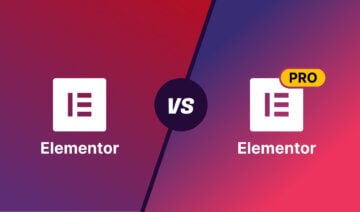Editor’s Rating
- Ease of Use 5
- Functionality 4
- Value for Money 4.5
- Documentation & Support 5
Summary
Elementor Hosting offers a straightforward way to create a website with WordPress and Elementor. For basic websites, it’s a great option that will simplify your life (and save you money). More complex websites will probably still want regular WordPress hosting, though.
Pros
- Don’t have to think about hosting – Because Elementor Hosting includes built-in hosting, there’s one less thing on your plate when it comes to creating and managing a WordPress website.
- Simple setup – The process of creating a website feels much more like Squarespace in terms of how simple it is.
- Still fully functioning WordPress – While Elementor Hosting “feels” more like a website builder, you’re still getting access to the full WordPress software, including the ability to install your own plugins and themes.
- Can offer excellent value – Because Elementor Hosting includes Elementor Pro at no extra cost, it can be very affordable when compared to other WordPress hosting providers.
- Full hosting access – You still get access to FTP and phpMyAdmin, which is a big upgrade over the previous Elementor Cloud experience.
- Generally fast performance for the money – While we did note some issues with performance, Elementor Hosting generally offered fast load times for the money.
Cons
- Inconsistent CDN performance – Despite running a lot of different tests, the built-in CDN still had inconsistent load times.
- Only offers Belgium datacenter – This could be an issue because of the inconsistent CDN performance that we experienced. It would also be an issue for any dynamic content that you can’t reliably cache to Cloudflare’s network.
- Still not as many tools as other hosts – While Elementor Hosting offers foundational features such as backups, FTP access, phpMyAdmin, and staging sites, it still doesn’t offer as many tools as hosts with cPanel or some managed WordPress hosts.
- Normal WordPress migration tools don’t work – If you have an existing WordPress site, it can be a bit tricky to move it to Elementor Hosting because the normal migration tools won’t work. Elementor Hosting has built custom tools to help you import your site, but it’s still a bit of a pain.
Considering using Elementor Hosting to build your next website? In our hands-on Elementor Hosting review, we’ll help you decide if it’s the right option for your situation.
In general, Elementor Hosting is a great solution for non-technical users who want to build a website with WordPress and the Elementor page builder plugin.
Elementor Hosting creates a native website builder-like feel, while still giving you access to the full flexibility of WordPress and Elementor. That is, you’re still free to install your own WordPress plugins and create a completely custom WordPress site.
It also offers great value with flat, transparent pricing that, for a lot of people, will be cheaper than maintaining a “traditional” self-hosted WordPress site.
Overall, we think it’s a good option for a lot of people, but definitely not for everyone. For example, more complex sites such as WooCommerce stores or membership sites will still likely want separate hosting, despite improvements that Elementor has made.
To understand which camp you fit in, I encourage you to keep reading our full hands-on Elementor Hosting review.
Table of Contents
- Elementor Hosting Review Summary
- What Is Elementor Hosting?
- Advantages of Elementor Hosting over Self-Hosting WordPress
- Elementor Hosting Pricing
- How to Create a Website with Elementor Hosting
- Exploring the Elementor Hosting Dashboard
- Migrating a WordPress Site to and from Elementor Hosting
- Elementor Hosting Performance Tests
- Elementor Hosting Review FAQs
- Final Thoughts on Elementor Hosting
Elementor Hosting Review Summary
If you’re in a rush, here’s a summary of our key findings. Keep reading for much more detail, including a bunch of hands-on performance tests that we ran.
| Starting Price (Promotional) | $9.99 / month |
| Starting Price (Regular) | $14.99 / month |
| Elementor Pro | 👍 Included at no extra cost. |
| Setup process | 👍 Simpler than “regular” hosting: 1. Register for an account. 2. Launch your site using a simple wizard. 3. Build using pre-installed Hello theme and Elementor Pro. |
| Datacenter options | 👍 All sites hosted in Belgium on Google Cloud infrastructure. 👎 This can be an issue for dynamic sites that can’t be cached to the CDN. |
| Content delivery network (CDN) | 👍 Integrated CDN from Cloudflare. 👍 Fully caches your site’s pages on Cloudflare’s network. 👎 We experienced inconsistent CDN performance for some locations. |
| Performance | 👍 Fast performance in most tests. 👍 Elementor Hosting can offer similar performance to more expensive hosts. 👎 The inconsistent CDN performance occasionally led to subpar results outside of Europe. |
| Backups | ✅ Automatic daily backups ✅ Manual on-demand backups |
| Technical access | ✅ FTP/SFTP access ✅ phpMyAdmin ❌ WP-CLI ❌ SSH access |
| Tools | ✅ Staging sites ✅ Site cloning |
| Security features | ✅ Free SSL certificates ✅ Web application firewall (WAF) ✅ Limit login attempts ✅ DDoS protection |
| We recommend it for… | 👍 Portfolios 👍 Brochure websites 👍 Simple blogs |
| We don’t recommend it for most… | 👎 WooCommerce stores 👎 Membership sites 👎 Online course sites |
What Is Elementor Hosting?
I like to describe Elementor Hosting like this:
It’s like “WordPress + Elementor” had a baby with Squarespace.
In one package, you can find everything you need to build a fully functioning website with WordPress and Elementor, including built-in hosting.
I’ll show you how it works in a second, but the basic idea is this:
You never need to think about hosting because Elementor Hosting takes care of that for you. Instead, you can focus on building your site:
- You sign up for Elementor Hosting.
- Elementor creates a new WordPress install for you on its Google Cloud-powered hosting. It will pre-install the Hello theme, the core Elementor plugin, and Elementor Pro.
- You start building your site within a couple of minutes. You can either import one of Elementor’s pre-made layout kits or build your site from scratch using Elementor’s visual, drag-and-drop interface.
At the same time, you still have a fully functioning WordPress site. You’re free to install your own plugins, add a new theme if you don’t want to use the Hello theme, and so on.
For more advanced users, you can also access the underlying hosting using FTP and phpMyAdmin, much like how other web hosts work.
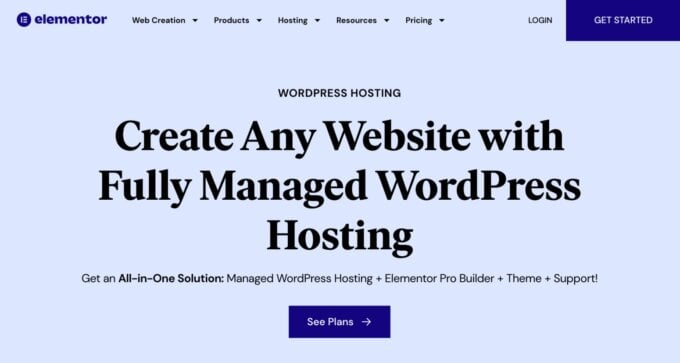
Elementor Hosting also gives you some of the same types of features that you’d get with a quality managed WordPress host, including the following:
- Support for custom domains
- Built-in content delivery network (CDN) from Cloudflare
- Automatic daily backups
- Manual on-demand backups when needed
- Free SSL certificates from Cloudflare
- Built-in security features such as a web application firewall (WAF), limiting login attempts, DDoS protection, and a Site Lock tool
- Staging sites to safely test changes to your site(s) (excluding the cheapest plan)
- Full database access via phpMyAdmin
- Full SFTP access via your preferred FTP client
- Site cloning (on higher-tier plans)
- 24/7 support via live chat
Advantages of Elementor Hosting over Self-Hosting WordPress
I think there are two main advantages that Elementor Hosting has over the traditional route of self-hosting the WordPress software:
- Simplicity
- Price
Simplicity
Elementor Hosting all-around simplifies the process of creating and managing a WordPress site.
You don’t need to worry about purchasing hosting, installing WordPress, buying a separate license for Elementor Pro, and so on.
Instead, you just sign up and start building your site using Elementor’s visual interface — it’s very much of a “website builder” feel. It even integrates choosing a website kit into the setup process, which adds to the “Squarespace-like” experience.
However, as this is also a full-featured WordPress site, you can install your own plugins as well. You also still get access to your underlying hosting via FTP and phpMyAdmin, which gives you a lot more flexibility than something like Squarespace.
Price and Value
I’ll talk about pricing in more detail in the next section, but the basic idea with Elementor Hosting is that you pay one fee for everything that you need to build a site, with no hidden surprises.
Sure, you might want to purchase some additional premium plugins beyond the included Elementor Pro plugin, which is true of any WordPress site.
But for most sites (especially personal portfolios or business brochure sites), you have everything you need to build an effective site for one flat fee, starting at $180 per year (or ~$120 for the first year).
While some cheap WordPress hosts can beat that price with their promo pricing, those are usually only temporary prices. And when you factor in the fact that you get access to Elementor Pro at no charge, Elementor Hosting is usually more affordable.
But at the same time, you’re still getting access to better performance than most cheap shared hosts, along with “managed WordPress” features such as automatic backups and integrated caching.
Elementor Hosting Pricing
Like a “regular” managed WordPress hosting provider, Elementor Hosting offers multiple pricing tiers — four different plans, to be exact.
However, Elementor Hosting is cheaper than most other managed WordPress hosting providers, with plans starting at just $9.99 per month.
What makes these plans even cheaper is that all of them include Elementor Pro at no extra cost. If you’re already planning to use Elementor Pro, that offers significant savings.
Of course, if you’re not planning to use Elementor Pro, you’ll miss out on a good chunk of the value.
For the most part, the main differences between the tiers are in the following metrics:
- The number of WordPress sites you’re hosting
- Storage
- Monthly visits
- Bandwidth
There are also a couple of feature differences between the plans:
- The staging site feature is not available on the cheapest plan.
- The site cloning feature is only available on the two highest-tier plans.
- The cheapest plan only stores backups for 14 days, while the other plans store them for 30 days.
Other than that, the features are pretty much identical between the different plans.
Which Elementor Hosting Plan Should You Use?
As you can see in the pricing table above, Elementor Hosting employs a “decoy pricing” strategy that makes the Business plan fairly unattractive in the grand scheme of things.
If you can’t fit inside the Basic plan, you might as well go straight to the Grow plan.
It offers higher resource limits and more features for not much difference in cost.
If you’ll be building multiple sites, it can actually work out to be cheaper than the Business plan when you factor in the value of the included Elementor Pro access.
In my opinion, the main purpose of the Business plan is to make the Grow plan look more attractive in comparison, which it effectively achieves. So unless that $3 per month is a dealbreaker, just go with the Grow plan if the Basic plan is too small for your needs.
How to Create a Website with Elementor Hosting
Now that you know all about Elementor Hosting, let’s actually get into how it works.
Overall, Elementor Hosting makes it super easy to create your site which, as I’ve mentioned a few times now, is one of the biggest advantages of the platform.
1. Complete the Site Setup Wizard
When you sign up for Elementor Hosting, it will launch a site setup wizard to help you create your site.
First, you’ll enter your site’s name.

Then, you can choose from one of the 34+ included website kits.
Or, you can just hit the “I’d rather start from scratch” button to create a blank site. You can always import a website kit later on if you change your mind.

And, that’s it!
Elementor will now set up your site, which only takes a couple of minutes.
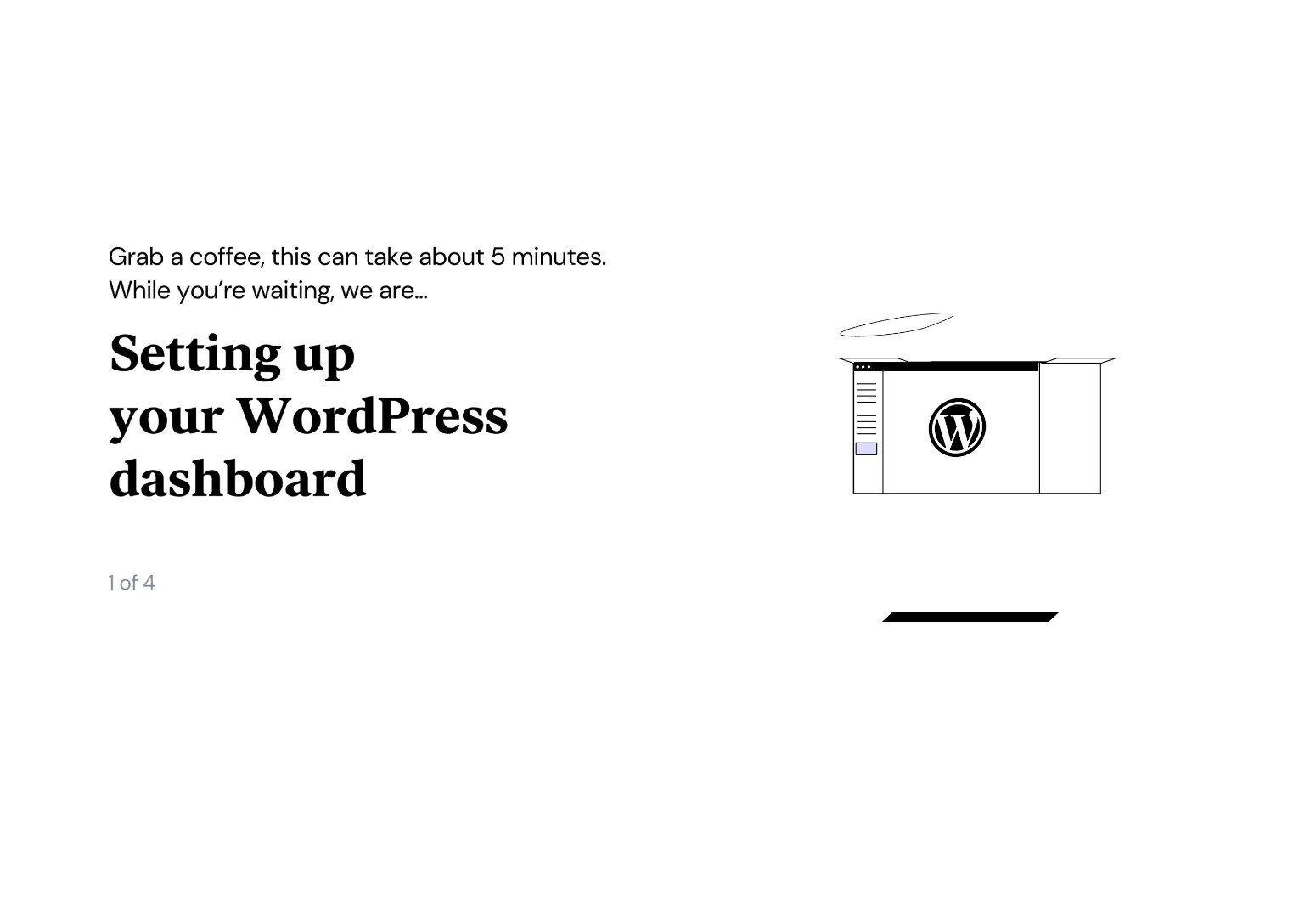
Once Elementor finishes the setup process, you’ll have a fully functioning WordPress site. Elementor will email the login credentials to your account.

2. Customize/Manage Your Site Using Elementor
Now, you can jump right in and start customizing your site with Elementor. You can read our Elementor Pro review to learn more about what it’s like to design your site with Elementor.
You’ll get access to the regular WordPress dashboard just as if you self-hosted your site, though Elementor will add a few useful interface elements to help you out.
Elementor also tweaks the styling a bit to create a somewhat unique experience, though the functionality is all the same as what you get with a “regular” WordPress site.
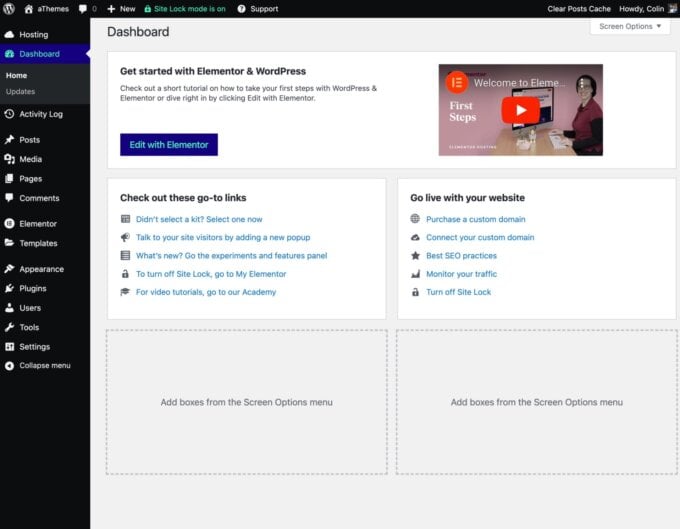
Elementor also already installed the Hello theme, Elementor, and Elementor Pro, so you can start building right away.
If you want to install your own plugins, you can do so just like any other WordPress site.
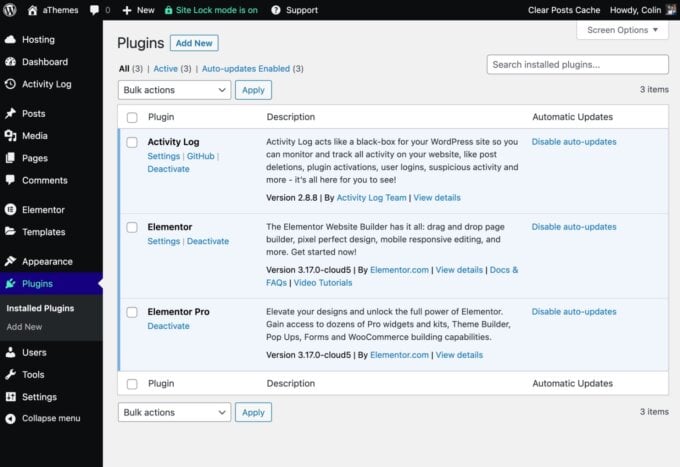
Elementor Hosting also adds its own Hosting tab in the WordPress dashboard that lets you manage caching behavior right from your WordPress dashboard.
It also includes quick links to help you access important areas in the Elementor Hosting dashboard, such as managing backups or creating a staging site.
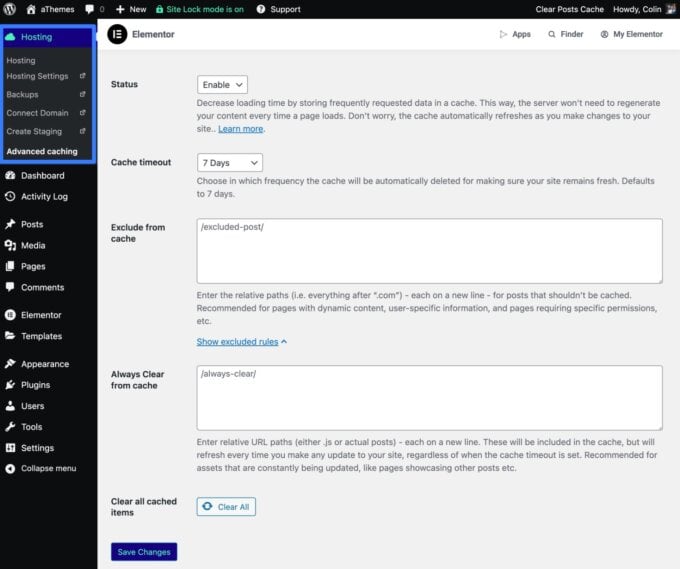
Speaking of the Elementor Hosting dashboard…
Exploring the Elementor Hosting Dashboard
In addition to working from the WordPress dashboard, you’ll manage some parts of your site from the Elementor dashboard, such as your site’s backups.
When you go to the Websites tab in Elementor, you’ll be able to quickly see which sites you’re hosting with Elementor Hosting and which sites you’re hosting elsewhere.
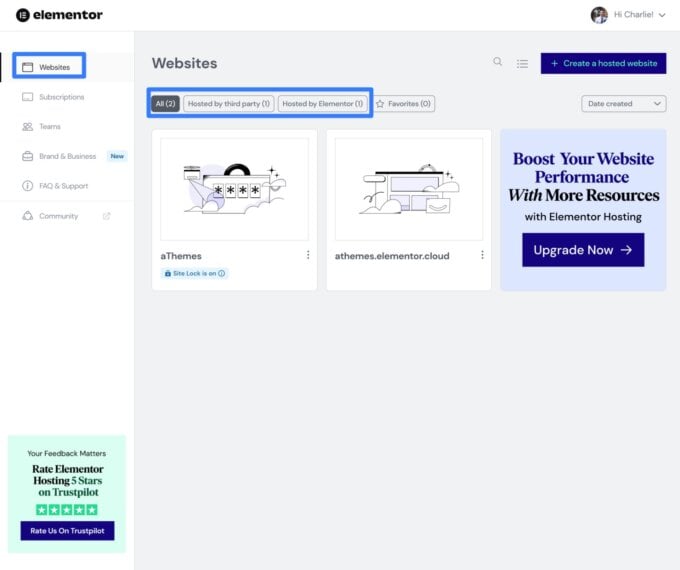
If you open the site’s dashboard, you’ll get access to several important areas in the sidebar:
- Manage Domains – This lets you connect your custom domain name. By default, Elementor Hosting starts you off on a temporary staging domain.
- Email Account – Once you connect your domain name, you can set up email sending. Elementor also has partnerships with Zoho Mail, Google Workspace, and Microsoft 365 if you want to create a custom business email.
- Backups – This lets you manage the automatic backups that Elementor Hosting takes every day and also create a manual on-demand backup when needed.
- Advanced – This lets you access more advanced tools such as staging sites, phpMyAdmin for database management, SFTP details to connect your FTP client, and more.
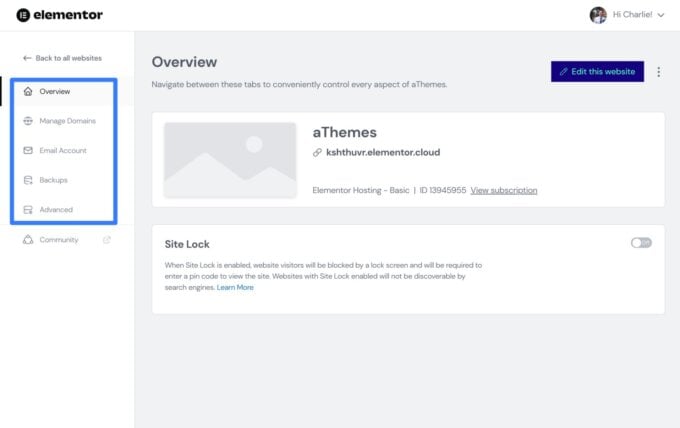
For example, if you go to the Manage Domains tab, Elementor Hosting includes a nice guided setup process to help you connect your site’s domain name.
If you go to the Backups tab, you’ll see a list of all your site’s backups, along with options to Restore a backup or Export a backup to download it to your local computer.
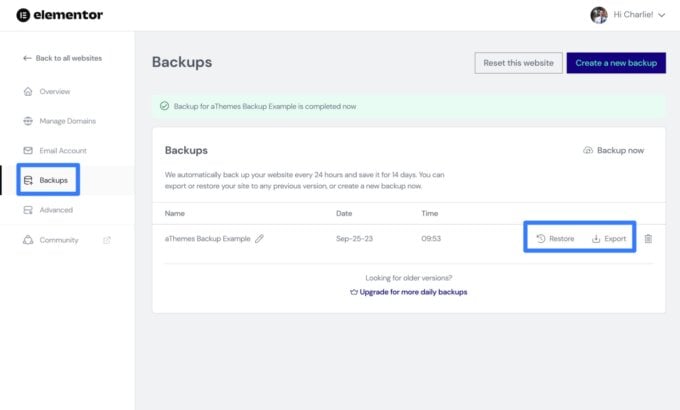
If you go to the Advanced tab, you can click SFTP details to view FTP credentials and Open database to open your site’s database in phpMyAdmin.
If your Elementor Hosting plan supports it, you can also create a staging site here.
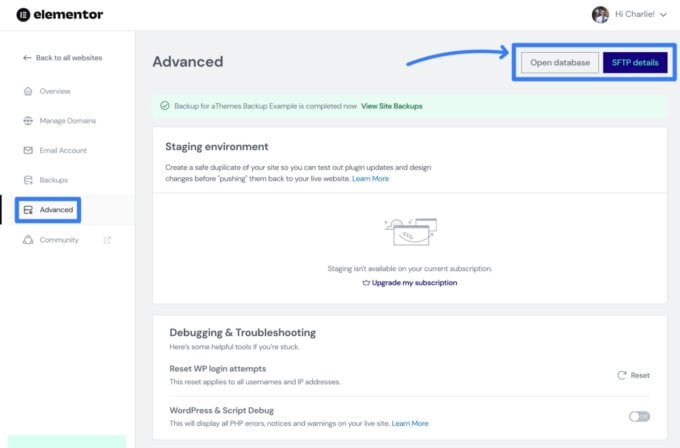
Elementor even adds a helpful notice to phpMyAdmin to warn you from breaking things, which is a nice touch.
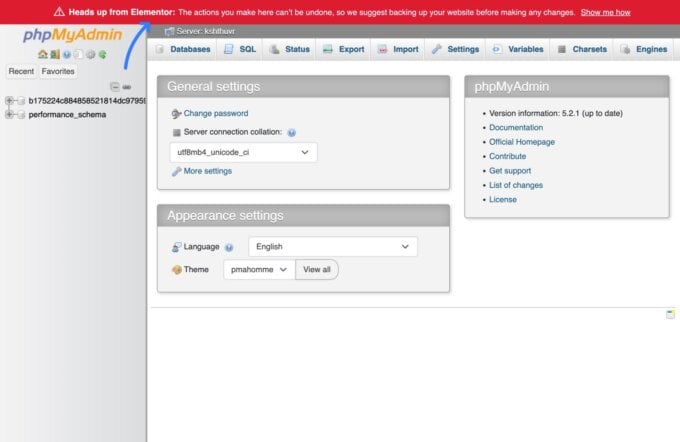
All in all, the Elementor Hosting dashboard is quite clean and gives you access to all of the fundamental tools that most people will need.
With that being said, you still don’t get access to the full array of tools that you would get with something like cPanel or some of the pricier managed WordPress hosts — e.g. there’s no tool to manage redirects.
This is definitely not a dealbreaker as most people don’t need all those advanced tools. But if you do expect to have tools that go beyond backups, staging, FTP, and phpMyAdmin, you might feel a bit disappointed.
Migrating a WordPress Site to and from Elementor Hosting
If you’ve already created a WordPress site on your own hosting, you can migrate it to Elementor Hosting. However, you won’t be able to use a normal migration plugin. Elementor has a detailed article that shows you how you can migrate your site to Elementor Hosting.
Note – migration only works if you’ve built your site with Elementor. I assume you have, though, because it wouldn’t make sense to use Elementor Hosting otherwise.
Also, if you want to move to your own hosting, you can migrate your Elementor Hosting site just like you’d migrate any other WordPress site. However, you will need to purchase an Elementor Pro license if you want to continue using the Elementor Pro features.
Elementor Hosting Performance Tests
When Elementor Hosting first launched (called Elementor Cloud back then), its performance was adequate but not amazing.
However, since moving to the more robust Elementor Hosting product, the performance has gotten much better, and Elementor Hosting can now compete with other performance-focused web hosts…though we did still experience some issues. More on those below.
To assess the performance of Elementor Hosting, we set up our own Elementor-powered website on Elementor Hosting.
We wanted to make it as realistic as possible so we used one of the provided website kits to create a realistic, fully functioning website.
We did not make any of our own performance improvements. However, beyond its Google Cloud infrastructure, Elementor Hosting already offers a number of built-in performance optimizations, including a Cloudflare-powered CDN and its own caching system.
To collect performance data, we used a few different tools:
- WebPageTest – This lets us collect detailed performance data from a single location.
- SpeedVitals – This lets us test the site from 10 different locations around the world at the same time to assess global performance.
Note – Elementor Hosting only operates a datacenter in Belgium, Europe. However, the built-in content delivery network should theoretically allow for fast load times around the globe.
Elementor Hosting WebPageTest Results
In this first test, we used WebPageTest to assess Elementor Hosting performance from a single location. Here’s how we configured our test:
- Test location: London, UK – This is on the same continent as Elementor Hosting’s Belgium-based data center.
- Connection speed: FIOS (20/5 Mbps) – While this produces “slower” results than using an unthrottled connection speed, it’s more realistic to what your actual human visitors will experience.
- Test runs – Run the tests nine times and display the median value.
Overall, Elementor Hosting did quite well here, with a TTFB of just 0.66 seconds and an LCP time of under 2.5 seconds:
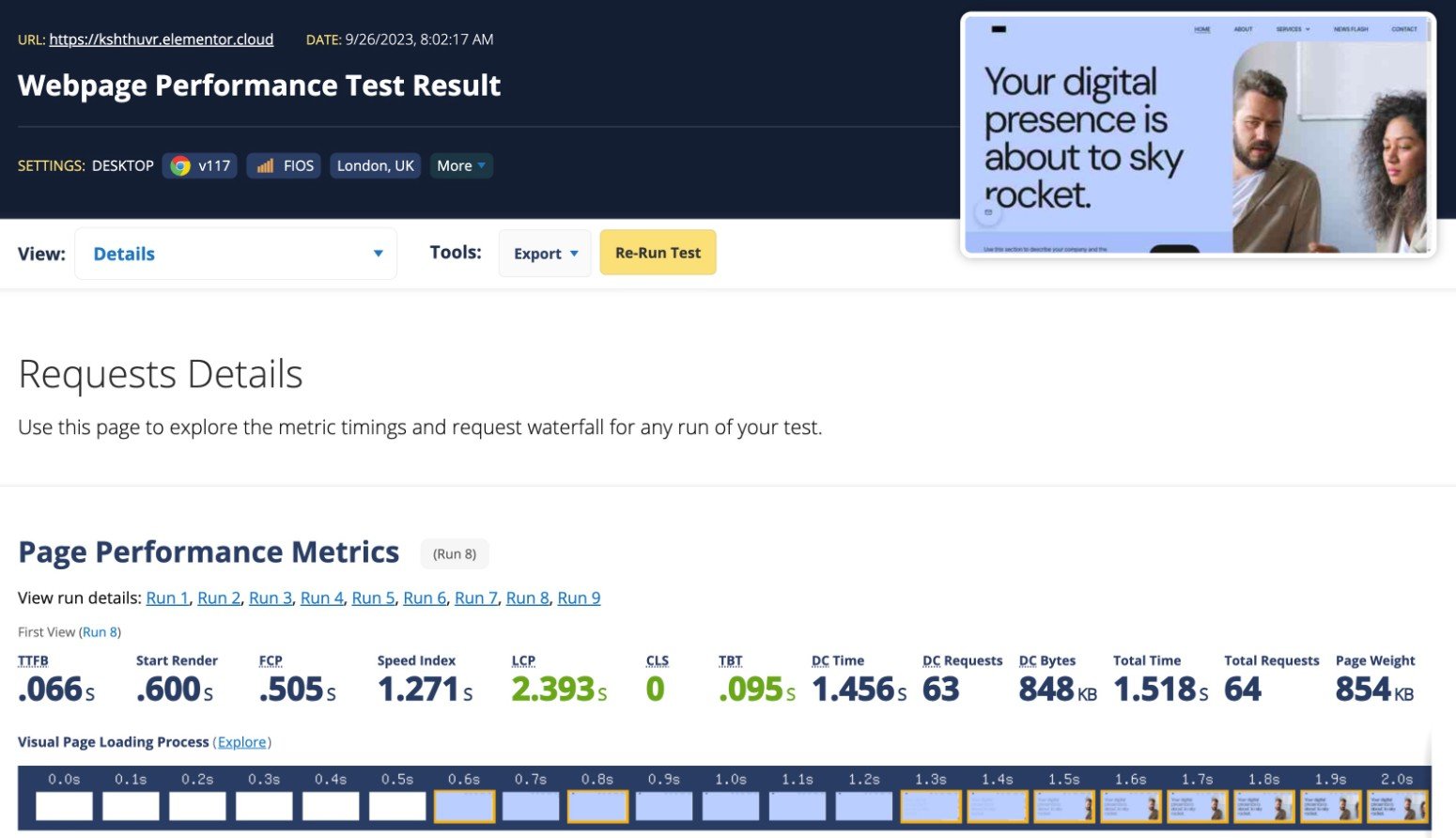
And again, this is for a fully built website using a kit and without any performance optimizations beyond Elementor Hosting’s caching.
If you were to add a performance optimization plugin such as WP Rocket to the mix, you could achieve even better results.
Elementor Hosting SpeedVitals Results
SpeedVitals is a helpful tool that lets us run simultaneous tests from 10 different locations around the world on every inhabited continent except Africa.
Remember, Elementor Hosting only operates from a Belgium datacenter. However, Elementor Hosting does integrate its own CDN to improve global performance.
Beyond caching static assets on the CDN, Elementor Hosting’s advanced caching system should cache your site’s full pages on the CDN.
When we tested from SpeedVitals, however, the CDN caching seemed a little spotty, with some locations benefiting from fast TTFB and LCP, while others were a bit slower.
For example, in this first run, you can see sub-100 milliseconds TTFB for some locations such as Brazil, Indonesia, the UK, and the Netherlands, but slower TTFB in other locations:
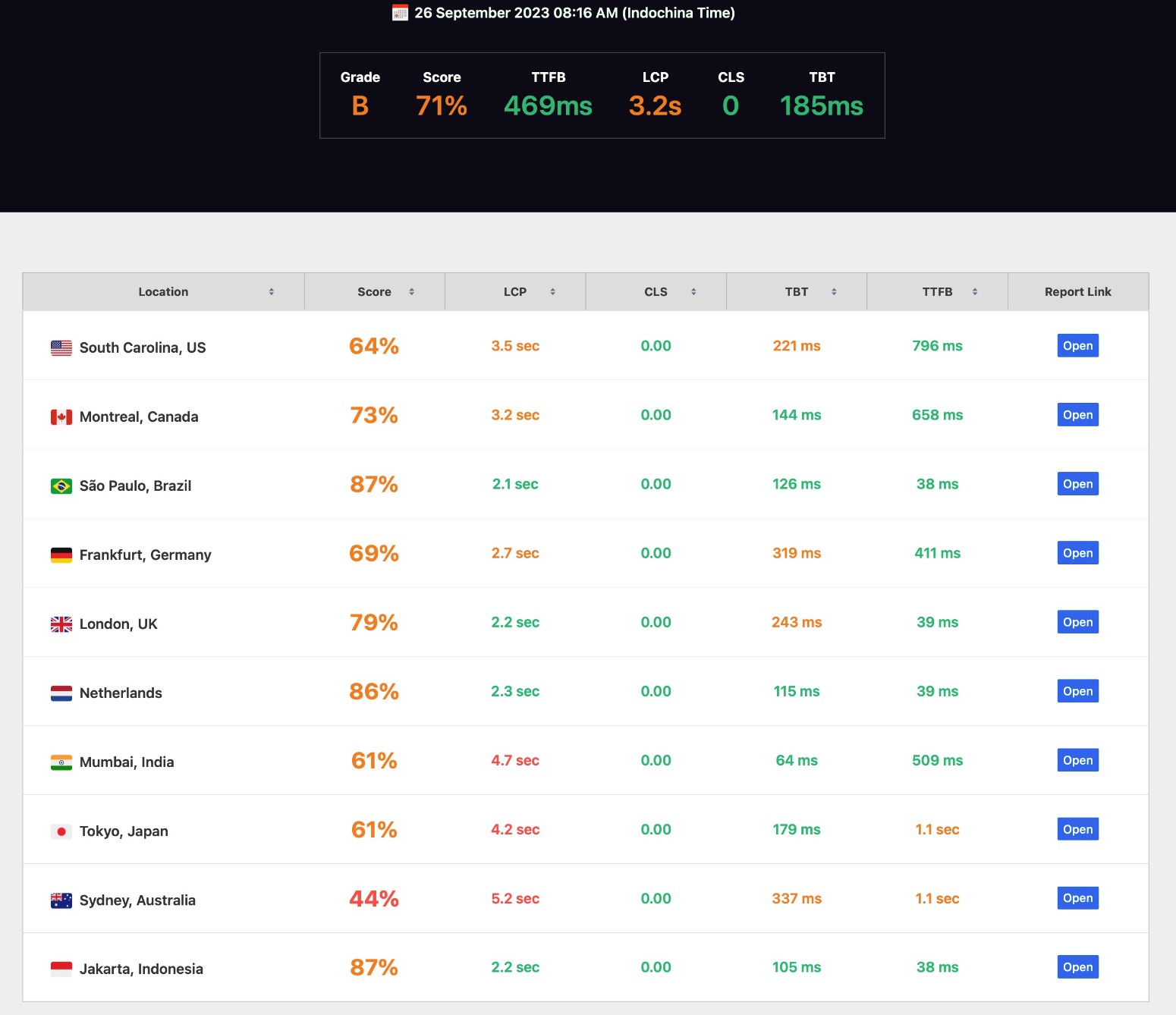
To make sure this wasn’t an issue with the cache not being preloaded, we waited for 10 minutes and then re-tested.
However, we still saw a similar pattern. The results are different, though.
For example, the TTFB in Canada dropped from 658 ms to 45 ms and the TTFB in Australia dropped from 1.1 seconds to just 28 ms.
However, there were also some load times that went in the other direction, with the Netherlands increasing from 39 ms to 823 ms and Brazil increasing from 38 ms to 847 ms:
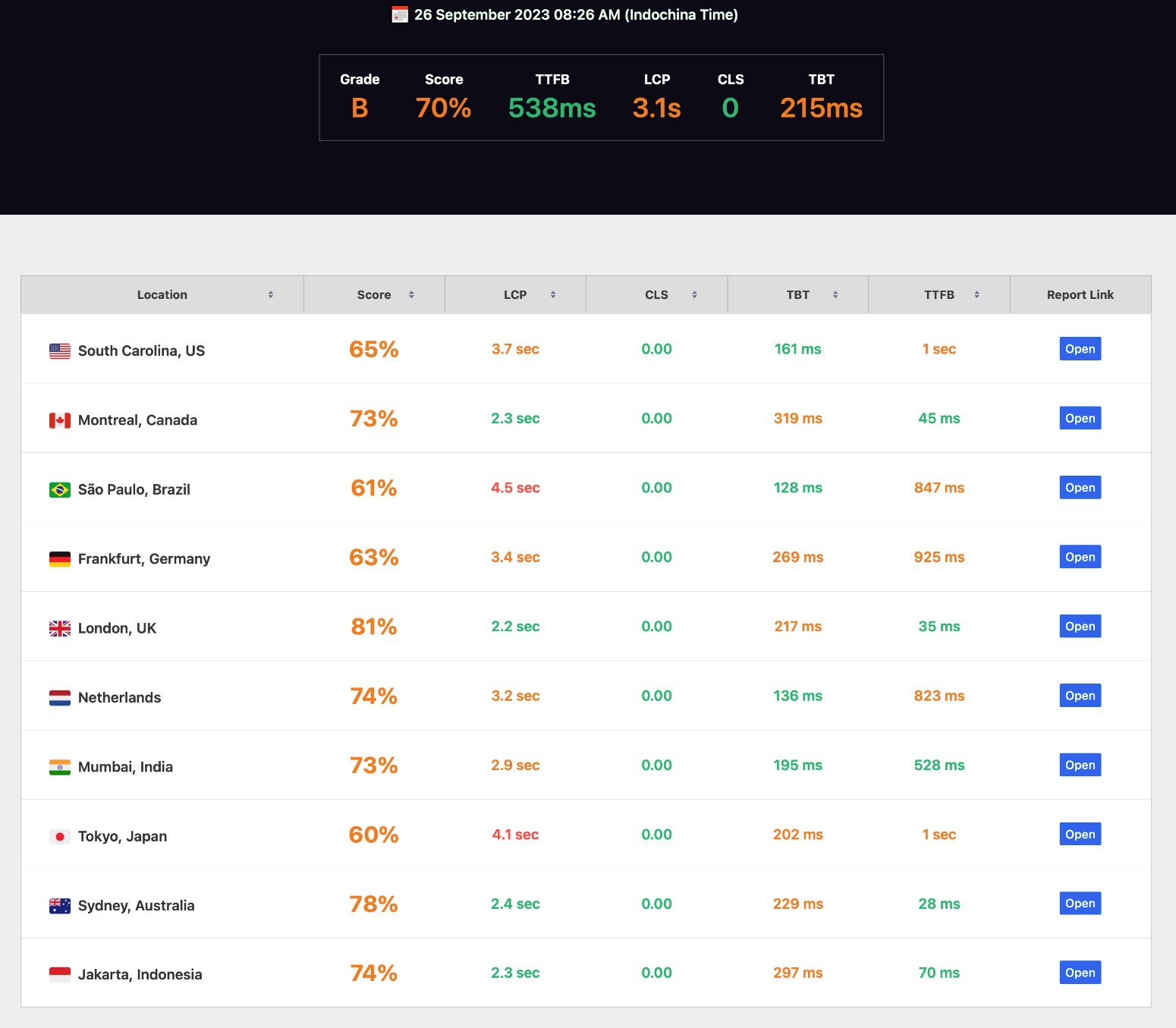
Overall, we’re not sure what to make of this pattern, which persisted over multiple days and at different times of days.
We also tested with KeyCDN’s global performance tool to see if the variable results were something unique to SpeedVitals, but the same trend continued there.
For example, here’s what the KeyCDN results look like for our Elementor Hosting site:
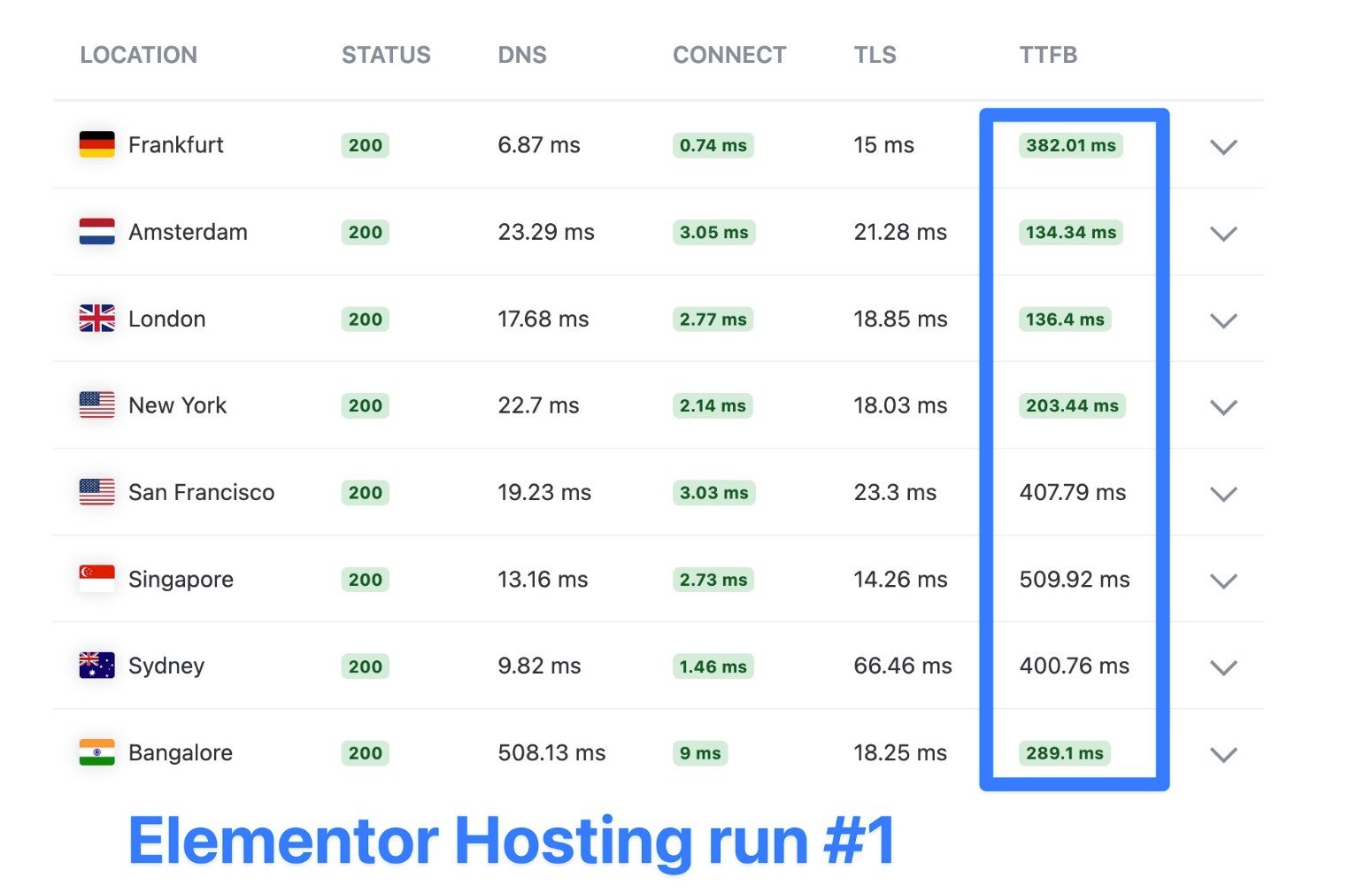
Here’s another run immediately after — you can see that the TTFB times have moved around a lot:
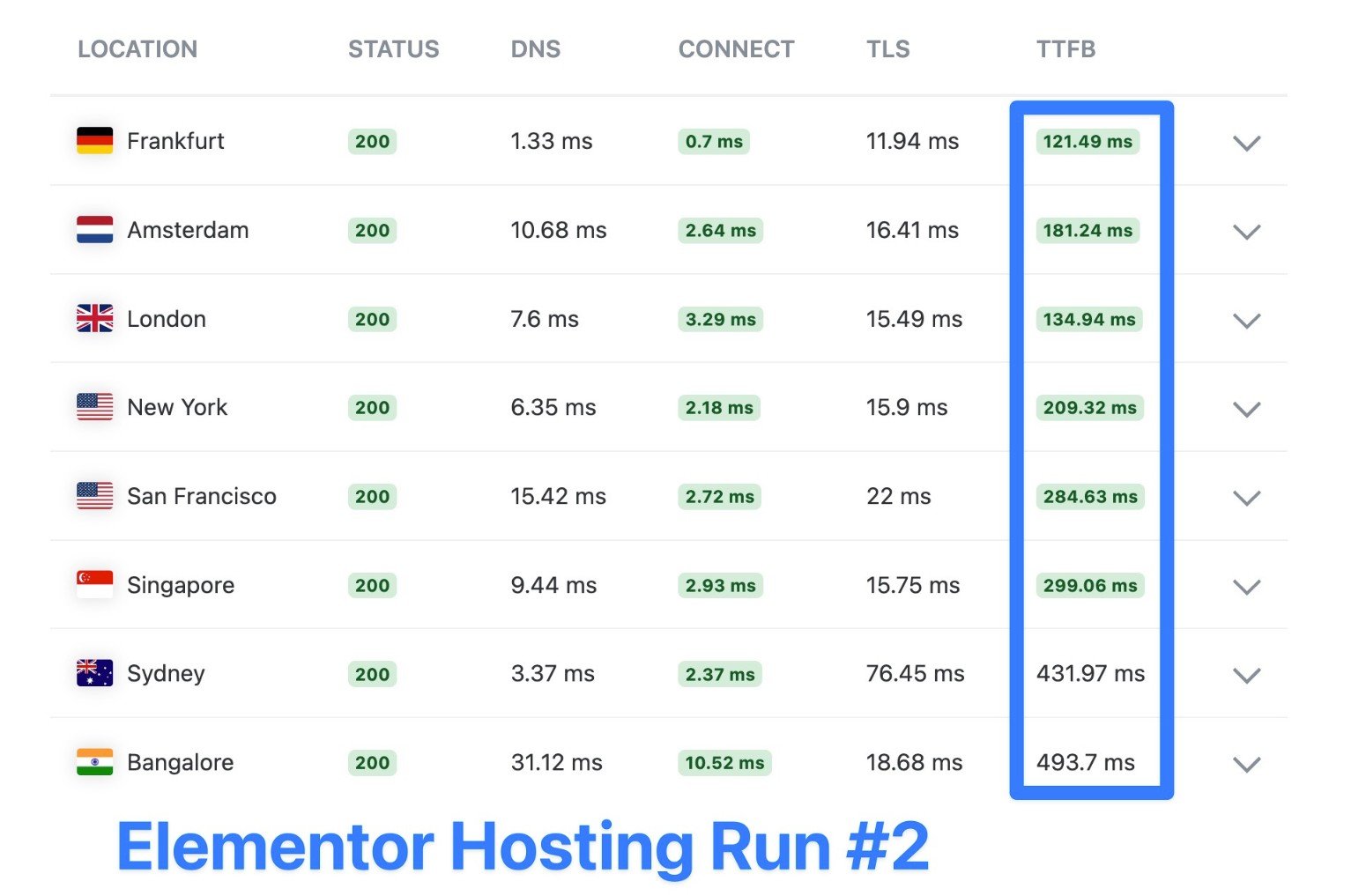
We’ve tested other hosts that use this Cloudflare-based caching approach, such as Rocket.net and Kinsta, without seeing anywhere near this level of variability.
For example, here’s what we get with Rocket.net and what we would expect to see from Elementor Hosting, given its using a similar Cloudflare-based implementation:
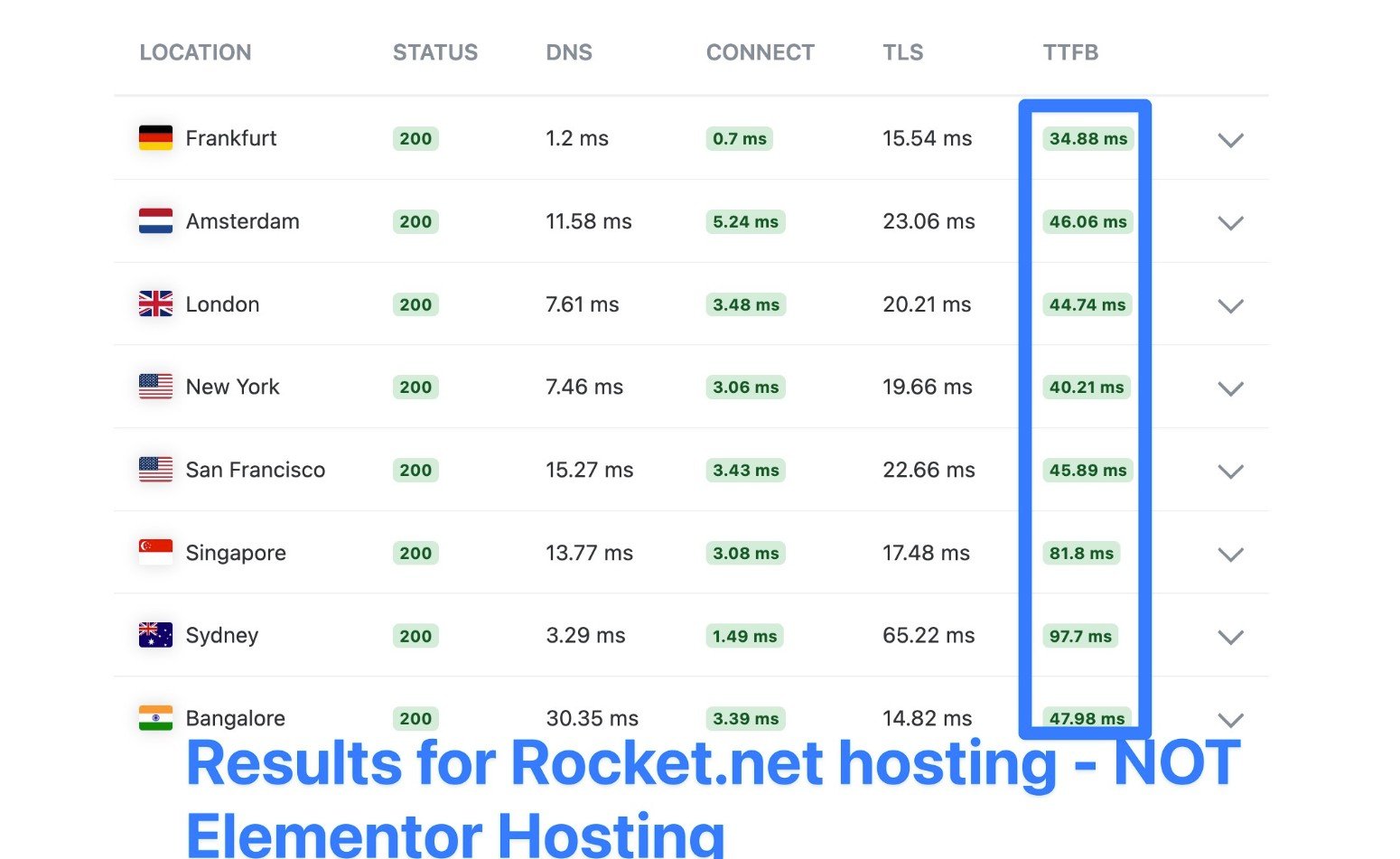
You can see that Rocket.net’s method of caching pages on Cloudflare’s global network led to uniformly fast TTFB metrics for all locations.
Side note – if you’re interested in Rocket.net (it’s a great host), you can check out our full Rocket.net hosting review.
Final Thoughts on Elementor Hosting Performance
Overall, Elementor Hosting performed well when we ran single-location tests with WebPageTest.
However, our testing of global performance found the integrated CDN to have somewhat erratic load times — often fast, but sometimes slower. This could change even for the same location when tested back-to-back.
We tried to rule out issues with the cache not being primed by testing multiple times, at different times of day, and on different days. We also tested with both the Elementor staging domain and a custom domain name.
Given that Elementor Hosting only offers origin hosting in Belgium, having this load time variability could be an issue if you’re targeting an audience outside of Europe.
Elementor Hosting Review FAQs
Because Elementor Hosting is a somewhat unique product in the WordPress space, let’s finish out our review with some common questions you might have.
Can I install other plugins on my Elementor Hosting site?
Yes – your Elementor Hosting site is a fully functioning WordPress site. You’re free to install any plugins that you want, including plugins from other developers. When it comes to using plugins and themes, there’s zero difference between Elementor Hosting and any other WordPress host.
Do I need to purchase Elementor Pro separately?
No – when you use Elementor Hosting, you get free access to Elementor Pro as part of the package. Elementor will even pre-install Elementor Pro for you so that you can start building right away.
This is one of the big things that can make Elementor Hosting such a good value.
Can I manage my Elementor Hosting site with FTP and phpMyAdmin?
Yes – Elementor Hosting now offers full FTP/SFTP access to manage your site’s files, as well as phpMyAdmin to manage your site’s database.
When Elementor initially rolled out this product, it didn’t include those features (it was called Elementor Cloud back then). However, the Elementor Hosting offering now gives you much more access to your site(s).
How fast is Elementor Hosting?
Elementor Hosting generally offers good performance for the money. However, the CDN performance was inconsistent in our testing, which might be an issue if you’re targeting an audience far away from the Belgium datacenter that Elementor Hosting uses.
Can I use Elementor without Elementor Hosting?
Yes – you are not required to use Elementor Hosting to build a website with Elementor. You’re always free to install Elementor on your own self-hosted site. However, if you want to use Elementor Pro on your own hosting, you would need to purchase Elementor Pro separately.
Can I migrate my existing WordPress site to Elementor Hosting?
Yes – if you already have an existing WordPress site that you want to move to Elementor Hosting, you can do that. However, you won’t be able to use normal WordPress migration plugins. Instead, you’ll need to use the special migration tools that Elementor has built.
Final Thoughts on Elementor Hosting
Overall, I think that Elementor Hosting is a great new option that will work well for a lot of the types of sites that people build with Elementor.
It does a nice job of simplifying things by eliminating the need to purchase separate hosting. At the same time, it also offers good value with its all-in-one pricing that includes Elementor Pro at no extra cost.
For portfolios, business brochure sites, or simple blogs, I think it’s an excellent option if you’re planning to build your site with Elementor.
However, for online stores, membership sites, online courses, and so on, I would still recommend purchasing your own performance-focused hosting so that you have more control over your site’s environment and performance.
While Elementor Hosting generally performed well, the variability that we experienced in our test of the CDN could become more of an issue for these types of sites.
The fact that Elementor Hosting only offers a Belgium-based datacenter could also be an issue for these types of dynamic sites because you wouldn’t be able to cache 100% of your site’s content to the CDN. This means that some visits would still need to be served from the origin server in Belgium.
If you want to learn more about Elementor in general, I encourage you to read our full Elementor Pro review.
Do you still have any questions about Elementor Hosting or this Elementor Hosting review? Let us know in the comments!
